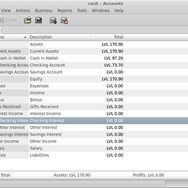GnuCash vs Moneydance
Compare features, pricing, and capabilities to find which solution is best for your needs.

GnuCash
GnuCash is a powerful, free open-source accounting software designed for both personal financial management and small business accounting. Utilizing the double-entry accounting principle, it provides robust tools for tracking expenses, income, assets, and liabilities, along with budgeting and financial reporting. by The GnuCash Project

Moneydance
Moneydance is comprehensive personal finance software for managing bank accounts, credit cards, investments, and budgets. It offers online banking, transaction syncing, and detailed financial reporting. by The Infinite Kind
Comparison Summary
GnuCash and Moneydance are both powerful solutions in their space. GnuCash offers gnucash is a powerful, free open-source accounting software designed for both personal financial management and small business accounting. utilizing the double-entry accounting principle, it provides robust tools for tracking expenses, income, assets, and liabilities, along with budgeting and financial reporting., while Moneydance provides moneydance is comprehensive personal finance software for managing bank accounts, credit cards, investments, and budgets. it offers online banking, transaction syncing, and detailed financial reporting.. Compare their features and pricing to find the best match for your needs.
Pros & Cons Comparison

GnuCash
Analysis & Comparison
Advantages
Limitations

Moneydance
Analysis & Comparison
Advantages
Limitations
Compare with Others
Explore more comparisons and alternatives
















